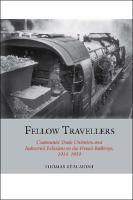Fellow Travellers
Communist Trade Unionism and Industrial Relations on the French Railways, 1914–1939
Abstract
Fellow Travellers examines the shifting practices and strategies adopted by Communist militants as they sought to build and maintain support on the railways. In a period in which the Communist party struggled to establish a foothold in many French workplaces, activists on the railways bucked the trend and set down deep and lasting roots of support. They maintained this support even through the sectarian period of the Comintern’s shift to class against class, deepening their participation within railway industrial relations and gaining the experience of engagement with managers and state officials upon which they would build during the years of the Popular Front. Here France’s railway employees joined alongside their fellow workers in shaping a new social contract for workers, extending the principle of democratic representation into the workplace. While the Popular Front experiment proved shortlived, its influence was long lasting. In the post Liberation period, the key tenets of the Popular Front experience re-emerged within the nationalised SNCF, shaping the particular character of railway industrial relations – the peculiar mix of collaboration and hostile confrontation between management and workforce that continues to make the French railways one of the most contested sectors of the modern French economy.
Keywords
communism; industrial relations; relations; railway workers; trade unionism; popular frontDOI
10.2307/j.ctvt6rjs5ISBN
9781789620801Publisher
Liverpool University PressPublisher website
https://www.liverpooluniversitypress.co.uk/Publication date and place
2019Grantor
Classification
Industrialisation and industrial history


 Download
Download Web Shop
Web Shop